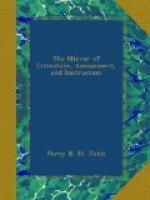yet the name of Catharine, which he gave to one of
his daughters, may be imagined to imply as much.
His mother, whose maiden name was Mignard, was of the
family of the celebrated painter. It was the accident
of Parr’s birthplace that, probably, laid the
foundation of his fame, for to the school of his native
village, then one of the most flourishing in England,
he was sent in his sixth year; whilst, under other
circumstances, it is likely that he would have been
condemned to an ordinary education and his father’s
business. So many seeds is Nature constantly and
secretly scattering, in order that one may fall upon
a spot that shall foster it into a a plant. In
his boyhood, he is described by his sister, Mrs. Bowyear,
as studious after his kind, delighting in Mother Goose
and the Seven Champions, and not partaking much in
the sports usual to such an age. He had a very
early inclination for the church, and the elements
of that taste for ecclesiastical pomp, which distinguished
him in after life, appeared when he was not more than
nine or ten years old. He would put on one of
his father’s shirts for a surplice, (till Mr.
Sanders, the vicar, supplied him, as Hannah did his
namesake, with a little gown and cassock;) he would
then read the church service to his sister and cousins,
after they had been duly summoned by a bell tied to
the banisters; preach them a sermon, which his congregation
was apt to think, in those days, somewhat of the longest;
and even, in spite of his father’s remonstrances,
would bury a bird or a kitten (Parr had always a great
fondness for animals) with the rites of Christian
burial. Samuel was his mother’s darling;
she indulged all his whims, consulted his appetite,
and provided hot suppers for him almost from his cradle.
He was her only son, and was at this time very fair
and well-favoured. Providence, however, foreseeing
that at all events vanity was to be a large ingredient
in Parr’s composition, sent him, in its mercy,
a fit of small-pox; and, with the same intent, perhaps,
deprived him of a parent, who was killing her son’s
character by kindness. Parr never was a boy,
says, somewhere, his friend and school-fellow, Dr.
Bennet. When he was about nine years old, Dr.
Allen saw him sitting on the churchyard gate at Harrow,
with great gravity, whilst his school-fellows were
all at play. “Sam. why don’t you play
with the others?” cried Allen. “Do
not you know, sir,” said he, with vast solemnity,
“that I am to be a parson?” And Parr himself
used to tell of Sir W. Jones, another of his school-fellows,
that as they were one day walking together near Harrow,
Jones suddenly stopped short, and, looking hard at
him, cried out, “Parr, if you should have the
good luck to live forty years, you may stand a chance
of overtaking your face.” Between Bennet,
Parr, and Jones, the closest intimacy was formed;
and though occasionally tried, it continued to the
last. Sir W. Jones, indeed, was soon carried,
by the tide of events, far away from the other two,
and Dr. Bennet quickly shot a-head of poor Parr in
the race of life, and rose to the Irish bench.




